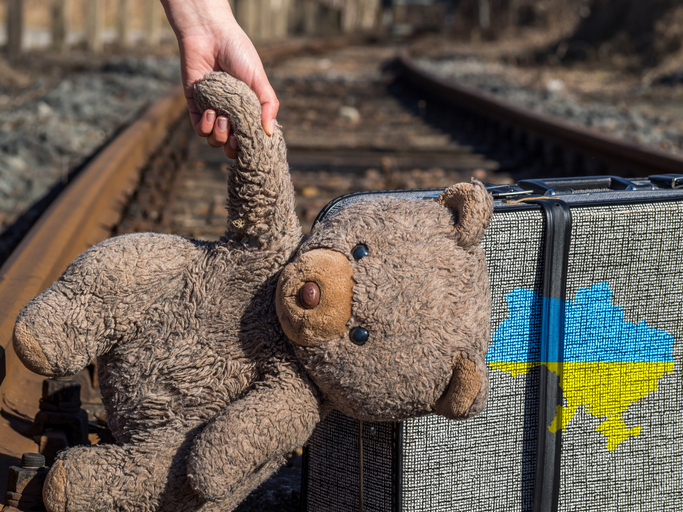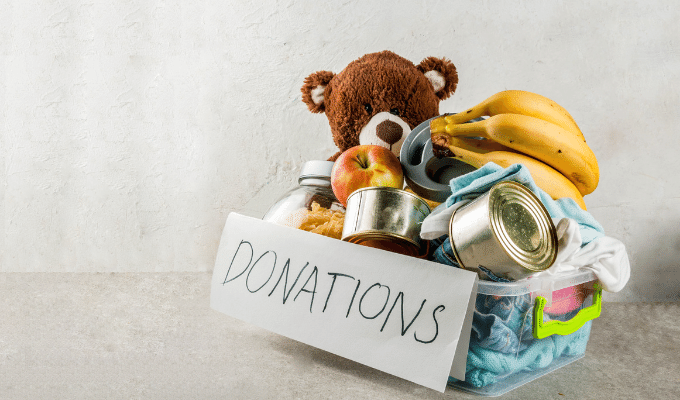Wise Giving Wednesday: New Posting on Ukraine Refugee Issues


New Posting on Ukraine Refugee Issues
BBB Wise Giving Alliance is pleased to release the second entry in a series of posts by Kateryna (Katya) Zhuk. Katya heads a Ukraine charity monitoring organization, Charity Tuner. This organization, along with BBB Wise Giving Alliance, is a member of an association of standards-based charity monitors from around the world.
In Part 1, Katya describes the trauma and mental health struggles of Ukrainians that fled to other countries or were internally displaced in Ukraine. In this second post, Katya discusses challenges faced by young children and teenagers as they seek to cope in unfamiliar surroundings in neighboring countries. The need for accessible psychological support is a key to their recovery.
Ukrainians Displaced by War: Part 2 – Families Far from Home
By Kateryna Zhuk
Since the first waves of migration from the former Soviet Union (in the 1990s) we have seen unsettling statistics: families could not withstand the new environment, problems, and responsibilities and fell apart. The same trend was observed in any country during the Covid-19 pandemic, and Ukraine was no exception. Now the war is dotting the i’s and crossing the t’s.
Torn from their homes, hundreds of thousands of Ukrainian families struggle with unemployment, lack of motivation, depression, inaccessibility of psychological support, sirens, anxiety, and utmost responsibility for children’s wellbeing. Oftentimes, it adds to any tensions from a peaceful time, which do not just miraculously disappear.
Not prepared for the war
Visiting a family psychologist has always been a luxury not many people in Ukraine could afford. And those who could, not always dared to. In our country, it is uncommon and unconventional. Years and years of promoting the importance of psychological help for at least adolescents bore some fruit. But many adults themselves came to a psychologist already during the war (though the figures are still disappointing, as we saw in Part 1). And going to a family psychologist together with your partner is almost an impossible task, even if your partner is nearby at the time and not at the front or in another country.
Lena Nureyeva, a crisis psychologist whom my children and I visit in Warsaw, says “Unfortunately, the contradictions that existed before often exacerbate in families. Especially for those who had to either move in with their entire family or have their material and living conditions severely deteriorate. As a result of such discomfort and frustration of the need for personal space, tension often arises and develops into a conflict, which cannot be resolved at this stage of their lives. Redistribution of roles in the family, loss of social status by family members, and unwillingness or inability, due to psychological trauma, to take responsibility and fulfill habitual family roles also lead to conflicts.”
It is no coincidence that after World War II feminism took a new turn — all responsibility for the family, income, and raising children fell entirely on women for several years during and after the war. And the same thing is happening now to Ukrainian women, both those who stayed in Ukraine and those who moved abroad.
And even though statistics show that official divorce figures are low, many families have postponed formalities for “after the war” because they are in different countries, or the husband is at the front. Because divorce is now either costly (if the spouse with children left Ukraine) or very long due to the disruptions in the judicial system.
“We try to understand somehow the way he/she behaves in certain situations. And, of course, no one ever asked their partners how they would behave during the war, because we never thought it would happen. That’s why many people are disappointed with their partners now,” says family psychologist Kateryna Holzberg.
A certain romanticization of war and the heroization of the military adds to the problem. Some women believe that if a man does not volunteer to serve and continues to work while waiting to be drafted, he is “the wrong man.”
Nevertheless, there are families who only become stronger, and more united during the war, who understand that all the grievances that used to be there are now irrelevant and that it is only possible to survive together by supporting each other. But they also struggle — with anxiety for those in danger or with the experience of loss.
“Then there is the somatic reaction of the body — the flare-up of chronic diseases, and getting new ones, oncology in particular. All this in the context of complicated access to medical services and the language barrier, triggers psychological trauma again and again, not allowing to break out of this circle,” explains Lena Nureyeva.
Another category of psychologists’ clients has no access to help. On their own, they must handle the problems not only of those who are with them, say, in Poland but also of those who stayed in Ukraine, worrying much about their lives, or facing their lack of action. Here you can see fatigue, exhaustion, often panic attacks, loss of sleep and appetite. And while adults “deal” with each other or try to recover to move on and learn to live in a strange world and different mentality, children find themselves to a certain extent deprived of the attention they are usually given.
Lost and still not found
An odd thing has happened in my family. In Warsaw, most people around me speak Polish, they do not understand English. So, my kids help me with the translation. At these moments, it is very hard to tell which one of us is older and more responsible, I admit that honestly. Interpreting for a mother is not at all the kind of responsibility a teenager expects from a parent. but so far there is nothing I can do about it. If a person I need to talk to does not understand English, I need help and I find it in my child.
A special place among the requests for psychological support belongs to teenagers who seem as if they were lost during the move. Often, they are compelled to study, or rather pretend to study, in two schools with different curricula, different approaches, and requirements. The last school year was mostly online, part of that time in the shelter. Some parents, to avoid losing their child’s connection with their homeland, had them attend Ukrainian online school after the offline school at their place of residence. The parents themselves cannot supervise this online learning personally, so children end up studying a lot on their own and get enormously tired. And this fatigue draws them into the virtual world, loosening the connection with the real one even more.
I deliberately gave up online school for the older kids. It was more important to me to give them free time for themselves, for communication. And I also understood that I would not be able to control the process. At some point, I was arranging a so-called externship. But now, at the end of the year, I understand that the whole burden of handing in the assignments falls on me and the kids either way. And we have a difficult way to go ahead
Teenagers often react very emotionally, much more than in the normal course of an adolescent crisis, to pressure from a parent. Especially as they do not understand why they must be torn away from their familiar home, friends, and lifestyle, endure being in a local school environment that is not always friendly, where they do not understand everything, cannot communicate in full, and feel constant discomfort.
Lena Nureyeva describes her experience: “Often teenagers say that in Polish school they just sit the time because they can’t understand the subject of the lesson. The foundation is depleted cognition the same as in adults, lack of motivation, difficulty in understanding an unfamiliar language and in a different, unfamiliar organization of the learning process, and lack of friendship in the classroom.
Those children who have been victims, even indirectly, of bullying in Ukraine expect and often find themselves in bullying situations in Polish schools. Often children who are prone to affective behavior show increased aggression, and this is also the result of their psychological trauma related to the war.
Many teenagers, as well as adults, in Poland and in other countries where they were forced to flee from the war, suffer from depression in one form or another. The situation is complicated by the lack of access to Ukrainian-language psychiatric care. In addition to this there is often a feeling of guilt, even betrayal, as teenagers perceive it, and often ask their parents why they were brought here. They all badly want to go home, back to their familiar world”.
In fact, there are many parents of teenagers around me who complain that their children want to go home, even though they are already aware at this age of what awaits them back there — they have heard sirens and explosions, some have seen the deaths of their friends. But they are drawn to their familiar environment, their language, their room after all (if that room still exists). They sincerely think that all their problems will end at home.
I remember a mother and daughter from Kharkiv who left for the countryside in Germany. They were warmly welcomed by a hosting family, fed, and cared for, as the mother shared with me on the phone. But her 12-year-old daughter wanted to go back home. So, she would shut herself in the barn and cut her wrists. Then the mother called me from Kharkiv: “We’re back. I could not help her. No matter what I said — a wall. She said I was a coward to be afraid of bombings, and that she was not. Katya, it is an hour and a half one way to the psychologist, the bus is early in the morning and in the evening. I could not handle it, it had to stop.” I found a crisis psychologist for them in Kharkiv and forced myself to let the story go.
What will it take to recover?
Sometimes I look at pictures from bomb shelters during the school day. It is not even a question of whether I trust the regular school basements repurposed as bomb shelters. For me, it is a matter of “getting used to it.” In the end, the difference between my children who left for Poland in March 2022 and the children who stayed at home or were internally displaced (IDPs) is merely in what psychologists they will see and when. One thing I know for sure is that the sooner it happens, the better.
However, as observations and the use of Internet search engines show, many psychological help projects self-promote on some thematic sites or, at most, run ads on Facebook. This means that the lifesaving phone number of charge-free psychological help may just not reach the end user, who is financially constrained and has limited mobility due to various circumstances (from health to transport).
In early April 2023, there was an official announcement that the Ukrainian First Lady, Olena Zelenska, would be in charge of promoting a responsible attitude toward mental health and seeing a psychologist as a must. The name of the project is “How are you?” We will follow the project’s development, more so as the project is coordinated by experts from WHO and financed by USAID. And, of course, the project pledges that over time every Ukrainian will have the opportunity to see a psychologist.
Kateryna Zhuk
Warsaw, Poland
June 26, 2023
Link to Relevant Charitable Organizations
Krona https://krona.niko.ua/en/
Pomogaem https://pomogaem.com.ua/
SOS Children Villages https://sos-ukraine.org/
Voices of children https://voices.org.ua/en/
Note: The links to charitable organizations listed above were compiled by the author, Kateryna Zhuk. Since these organizations are not located in the United States, contributions from Americans may not be deductible as charitable donations for federal income tax purposes. BBB Wise Giving Alliance has not evaluated these charities and has not determined whether they meet the BBB Charity Standards.
If you or someone you know is at risk for suicide, seek help immediately. In the U.S., call the National Suicide Prevention Hotline at 800-273-TALK (8255) or visit suicidepreventionlifelin
Heart of Giving Podcast
In this week’s Heart of Giving Podcast, BBB Wise Giving Alliance features Part 1 of a discussion with Angela P. Walton of Breakthrough Marketing Consulting. She describes how nonprofits can navigate the increasingly fragmented media environment and adapt to every-evolving media and audience trends.
Recent Reports
We are always working with charities to publish or update reports for donors. Visit Give.org or local BBBs to check out any charity before giving. Our recently evaluated charities include:
Muscular Dystrophy Association
Finally, remember to let us know by going to give.org/charity-inquiry if you are interested in seeing a report on a charity not on the list and we will do our best to produce one.


